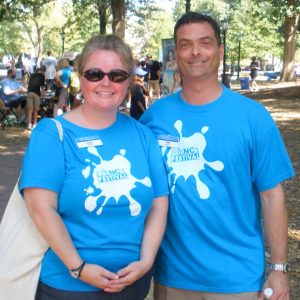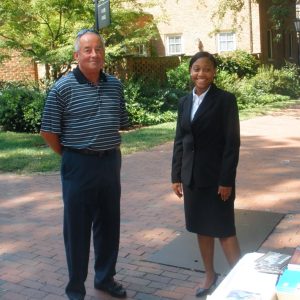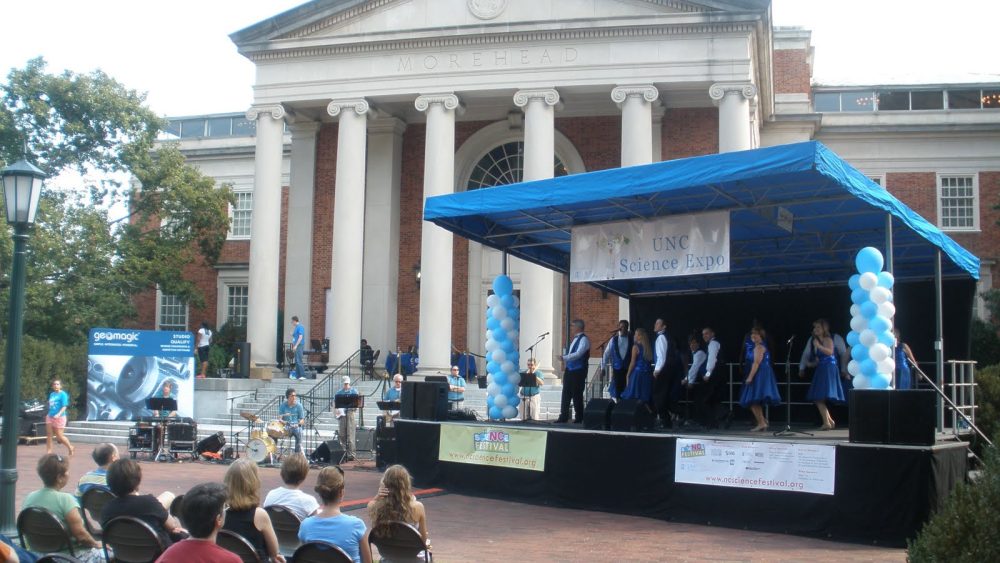
Denise Young and Todd Boyette at the first NC Science Festival in 2010
Photo by RCC3
Processed with Lensa with Auto Adjustments
The 2023 North Carolina Science Festival will feature more than 800 science events in all 100 counties in the state. Robotic sumo wrestling in Burnsville. Fossil digging in Charlotte. Nature journaling in Sapphire. Mathematical masterpiece making in Chapel Hill. Star gazing in Nags Head.
The monthlong series of eclectic and educational science events might not have been possible if not for longstanding support from the Burroughs Wellcome Fund. In 2010, BWF provided the initial funding to launch the inaugural North Carolina Science Festival, which became the first statewide endeavor of its kind. In 2015, BWF gave a $1 million gift to create an endowment for the festival, which has enabled it to keep going even amid economic downturns and a global pandemic.
“It was a game-changer,” said Todd Boyette, Director of Morehead Planetarium and Science Center and Co-founder of the North Carolina Science Festival. Boyette first floated the idea for the festival during a board meeting of the North Carolina Science, Mathematics, and Technology (SMT) Education Center, which is housed and supported by BWF. Sam Houston, President and CEO of the SMT, championed the idea and connected Boyette with John Burris, who led BWF at the time, to gain sponsorship.
“Part of the mission of BWF is education, so it wasn’t a hard sell,” said Houston. “What Todd and the rest of the leadership of the NC Science Festival did is say let’s take a month out of every year to show that science education is important to North Carolina’s economy. Sometimes we miss the relationship between the two. Education is the economic stimulus for North Carolina, and this country, and the world — it’s clearly the route to a better world for everyone.”

Sam Houston and Chelsea Sumner in 2010
Photo by RCC3
Processed with Lensa with Auto Adjustments
A modern-day state fair
In the 1800’s, state fairs cropped up across the country as a way to celebrate the agricultural economy. As North Carolina’s economic engine shifted gears from agriculture to science and technology, Boyette envisioned science festivals as a way to celebrate the modern economy. “It makes so much sense that we celebrate what we value,” he said. “I also think that from a societal standpoint, the reverse is also true — we value what we celebrate.”
Rather than host the festival in a single city, following the model of state fairs from Nebraska to New York to North Carolina, Boyette and festival co-founder Denise Young wanted this new type of celebration to take place all over the state. At first that proved difficult, as many events emerged organically from the scientific powerhouses in Research Triangle Park but not elsewhere. So the organizers developed partnerships with over 300 schools, libraries, museums, and a variety of science-based organizations, from the mountains to the coast.
“One of the things that I am most proud of is how the NC Science Festival brought communities together around science and technology,” said Young, who was at Morehead for many years before becoming Executive Director of the Bell Museum in St Paul, Minnesota. Young noticed that most of the people assembled at their early meetings had never met even though they lived in the same community and had similar STEM-based objectives and interests. The festival gave them a reason to connect.
“But what we observed over the years is that those same folks would get together to learn and plan other STEM efforts, support one another, and strengthen their communities through STEM – throughout the calendar year, not just during the festival weeks,” she said. “And those collaborations continue. To me, that is the lasting legacy of the festival for NC.” In June, Young is moving back to the state to lead the North Carolina Museum of Natural Sciences in Raleigh. She said she is particularly excited about reconnecting with our science-savvy community and helping it expand further.
Science for all

Alyse Campbell – future scientist 2010
Photo by RCC3
Processed with Lensa with Auto Adjustments
The North Carolina Science Festival has not only helped to instill a love of science in citizens of the Tar Heel State, but it has also created a model for other states to follow. For several years, it received funding from the National Science Foundation to provide technical assistance and support for other local, regional, and statewide festivals. Arizona launched its weeks-long SciTech Festival, which closely mirrors North Carolina’s, in 2012 after a visit here. In Wisconsin, organizers have asked Boyette for advice on how to scale up their Madison-based celebration to a more expansive one.
Boyette regularly networks with the leaders of over 50 science festivals across the country. He remains quite proud that $1 million gift from BWF was the first endowment given to any U.S. science festival.
That endowment – which the last time Boyette checked was up to $1.4 million — helped the North Carolina Science Festival weather the uncertainty of the pandemic. “April of 2020 was strange,” said Boyette. From early March on, he and his staff discussed setting up sanitizing stations, then limiting the size of events, then canceling the events altogether. “We went from not having a clue about what this pandemic was going to do to pivoting to a virtual festival within a month,” he said.
The festival was all virtual in 2020, mostly virtual in 2021, and a quarter virtual in 2022. This year’s festival promises to be 95% in-person. The theme is “Full STEAM Ahead,” a play on the Science, Technology, Engineering, Arts, and Math acronym that pervades so many educational efforts these days and a nod to many people’s desire to move on from the craziness of the last three years.
“I love the play on words, and this is the first year that we think we’re full steam ahead,” said Boyette. “We’re developing some interesting partnerships with the arts that we know will extend beyond the festival, so I’m excited to see where that goes. I can’t wait to get on back out on the road and see these events in action.”
The North Carolina Science Festival runs from April 1–30, 2023. To find a full list of events, visit ncsciencefestival.org.


Comments are closed.